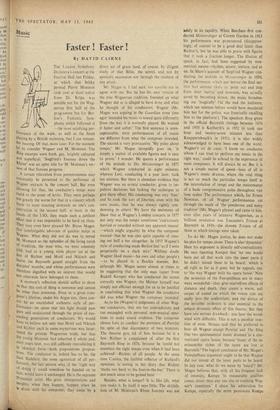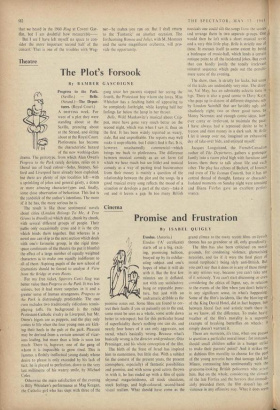M u sic Faster ! Faster !
By DAVID CAIRNS TIIE London Syniphony Orchestra's concert at the Festival Hall last Friday, at which that brisky juvenal Pierre Monteux took over at short notice from Dr. Krips, was notable not for the Wag- nerian first half of the programme but for Ber- lioz's Fantastic Sym- phony which followed it —the most satisfying per- f6rmance of the work, as well as the finest Playing by a British orchestra, that I can remem- ber hearing. Of that, more later. For the moment let us consider Wagner and M. Monteux. The Ring excerpts were fresh, gay, brightly coloured and superficial. 'Siegfried's Journey down the Rhone' was an apter title for M. Monteux's ver- sion of that famous progress.
A certain relaxation from portentousness may reasonably be permitted to the performer of Wagner extracts in the concert hall. But even allowing for that, the conductor's tempi were rapid to the point of levity. They were perhaps not greatly the worse for that in a concert which made its most exacting demands on one's con- centration in the second half; at least, in the hands of the LSO, they made such a jubilant effect that it was impossible to be hard on them. They may even have pleased Mr. Bryan Magee, glat indefatigable advocate of quicker tempi in Wagner•. What they did not do was to reveal Monteux as the upholder of the living torch of tradition, the man who, we were solemnly told, had as a young viola player sat at the feet of Richter and Mottl and Nikisch and learnt the Bayreuth gospel straight from the disciples' mouths, and whose performances were therefore dignified with an interest that would not otherwise have belonged to them.
A moment's reflection should suffice to show us that this sort of thing is nonsense and cannot be other than nonsense. Even in a great com- Poser's lifetime, under his Argus eye, there can- not be an established authentic style of per- formance—let alone that this light should pass Pure and undistorted through the prism of suc- ceeding generations of conductors. We would have to believe not only that Mottl and Nikisch and Richter each in some mysterious way incar- nated the pristine Wagnerian truth, but that the young Monteux had inherited it whole and, sixty years later, was still selflessly reproducing it In identical form—both preposterous proposi- tions. The conductor is, indeed has to be, the least Buddhist, the most egotistical of all per- formers, the last person who, if the 'right way of doing it' could somehow be handed on to him, would leave it unchanged. He is the supreme protestant artist. His great interpretations and insights, when they happen, happen when he Is alone with his composer; they come by a
as
ugh nos for nall i0r4 iild- ave lid- csia iscd pod filer mat -nos Dr. of hat is a :es. and hie leir it direct act of grace (and, of course, by diligent study of that Bible, the score), and not by apostolic succession nor through the medium of any priest.
Mr. Magee is. I feel sure. too sensible not to agree with me. But he has his own version of the true Wagnerian tradition, founded on what Wagner did or is alleged to have done and what he thought of his conductors. Wagner (Mr. Magee was arguing in the Guardian some time ago) 'intended his music to sound quite differently from the way it is normally played. He wanted it faster and softer.' The first sentence is unex- ceptionable; most performances of all music are different from what the composer intended. The second is very provocative. 'My point about tempo,' Mr. Magee intrepidly goes on, 'is simply a matter of available figures and is easy to prove.' I wonder. He quotes a performance of the prelude to Die Meistersinger in 1871 which Wagner conducted in eight minutes; whereas Levi, conducting it a year later, took ten minutes. But there is abundant evidence that Wagner was an erratic conductor, given to im- pulsive decisions but lacking the technique to give them effect. His conducting was very 'free,' and he took the sort of liberties, even with his own music, that he was always rightly con- demning in others. We have the testimony of Shaw that at Wagner's London concerts in 1877 not only was the tempo sometimes 'capriciously hurried or retarded without any apparent reason' —which might arguably be what the composer wanted—tut he was also quite capable of miss- ing out half a bar altogether. In 1855 Wagner's style of conducting made Berlioz feel 'as if I were perpetually on a slack wire.' Without doubt Wagner liked music—his own and other people's —to be played in a flexible manner. But, although Mr. Magee seems almost at times to be suggesting that the only man (apart from Rudolf Kempe) who has conducted the scores correctly was Wagner, the Meister himself was simply not efficient enough for us to be justified in concluding that what Wagner the conductor did was what Wagner the composer intended.
As ,to his (Wagner's) judgments of other Wag- ner conductors, they are too contradictory and too entangled with personal, non-musical emo- tions to make sound evidence. The composer choses Levi to conduct the premiere of Parsifal (in spite of that discrepancy of two minutes). The theorist gets rid of him because he is a Jew. Richter is complained of, after the first Bayreuth Ring in 1876, because he 'could not maintain the right tempo even when it had been achieved'—Richter of all people. At the same time Cosima, the faithful reflector of Richard's opinions, is noting in her diary that Richter 'sticks too hard to his four-in-the-bar.' There is, not much sense to be gained here.
Besides, what is tempo? It is, like life, what you make it. In itself it says little. The skittish- ness of M. Monteux's Rhine Journey was not solely in its rapidity. When Beecham .first con- ducted Meistersinger at Covent Garden in 1913 his performance was pronounced (disapprov- ingly, of course) to be a good deal faster than Richter's; but he was able to prove with figures that it took• a fraction longer. The illusion of speed, in fact, had been suggested by non- metrical means—rhythm, accent, texture, and so on. In Shaw's account of Siegfried Wagner con- ducting the prelude to Meistersinger in 1894, the performance, which nisi before the final sec- tion had seemed likely to 'peter out and stop from sheer inertia' and slowness, was actually saved by becoming slower, the music broaden- ing out 'magically' ('at the end the audience. which ten minutes before would have murdered• him but for the police, was frantically recalling him to the platform'). The speediest Ring given in the official Bayreuth timings between 1876 and 1953 is Keilberth's in 1952 (it took one hour and twenty-seven minutes less than Knappertsbusch's in 1951); it is also widely acknowledged to have been one of the worst. Wagner's cri de carer, '1 know no conductor whom 1 can trust to perform my music in the right way,' could be echoed in the experience of most composers. It will always be so. But it is not a simple matter of speed—least of all in Wagner's music dramas, where the vital thing is not so much the particular tempo itself as the interrelation of tempi and the maintenance of a basic comprehensive pulse throughout vast time scales. The performance which, for Ernest Newman, of all Wagner performances cut through the murk of 'the ponderous and noisy tradition' (Mr. Magee's phrase) and came to him. even after years of intensive Wagnerism, as a brilliant revelation was Toscanini's Tristan at Bayreuth in 1930—the slowest Tristan of all those at which timings were taken.
To do Mr. Magee justice, he does not make his plea for tempo alone. There is also 'dynamics.' Here his argument is directly self-contradictory. He says (quoting Kempe) that `no one would have put all that work into the inner parts if he didn't intend them to be heard,' which is all right as far as it goes; but he appeals, too, to 'the way Wagner built his opera house.' Now the acoustics of the Festspielhaus are in many ways wonderful—they give marvellous effects of distance and depth, they create a warm, soft carpet of sound on which the voices ride out easily into the auditorium; and the device, of the invisible orchestra is also essential to the unique dramatic effect of this theatre. But they have one serious drawback : you hear the wood- wind with difficulty. This is not a peculiar reac- tion of mine. Strauss said that he preferred to hear all Wagner except Parsifal and The Ring (the two quintessential music dramas) in a con- ventional opera house, because 'many of the in- exhaustible riches of the score are lost at Bayreuth.' The logical conclusion of Mr. Magee's Festspielhaus argument ought to be that Wagner did not intend all the inner parts to be heard. In any case, what do we mean by 'heard'? Mr. Magee believes that, with all his frequent lack of intensity, Kempe 'in measurable qualities comes closer than any one else to realising Wag- ner's intentions.' I share his admiration for Kempe, especially the more passionate Kempe that we heard in the 1950 Ring at Covent Gar- den, but I am doubtful how measurable— But I see I have left myself no space to con- sider the more important second half of the concert. That is one of the troubles with Wag- ner—he makes you run on. But I shall return to the 'Fantastic' on another occasion. The forthcoming Romeo and Juliet, with M. Monteux and the same magnificent orchestra, will pro- vide the opportunity.







































 Previous page
Previous page